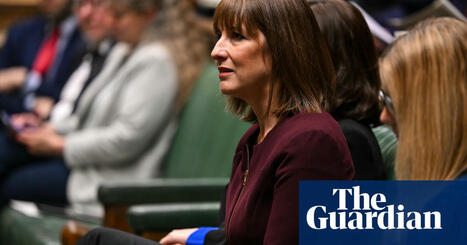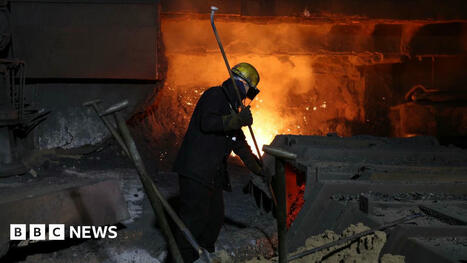EY Item Club predicts GDP of only 0.8% this year as Ipsos Mori poll shows three-quarters of Britons expect economy to get worse
Get Started for FREE
Sign up with Facebook Sign up with X
I don't have a Facebook or a X account

 Your new post is loading... Your new post is loading...
 Your new post is loading... Your new post is loading...
From
www
The government is considering nationalising the company, which employs some 2,700 people.
Graham Watson's insight:
It seems as though the fate of British Steel hangs in the balance, with the company in danger of running out of materials as its future is being debated. There's some talk that the government are going to step in nationalise the company to prevent job losses but this hasn't been agreed as yet. and would have a high opportunity cost.
From
www
The BBC understands the PM is considering several options to mitigate the impact of US tariffs on the UK.
Graham Watson's insight:
How might the UK respond to President Trump's tariffs?
It seems as though the car industry might get some government support and the targets for zero emissions vehicles are likely to be relaxed; additionally, there's going to be an incentive to establish stronger trading relations with other trade partners and the government are likely to bring forward investment plans. Whether or not this is going to see a relaxation of the fiscal rules, something that's been a big topic of debate so far this year, is another matter.
The key questions answered after the US president shook up the global economy with what he called liberation day
Graham Watson's insight:
This Observer piece, penned by Phillip Inman looks at the impact of President Trump's tariffs from a uniquely British perspective, noting that it poses a threat to economic growth, investment and inflation.
From
www
Some UK exporters to the US see a chance to grow their firms, even as others fear a drop in sales.
Graham Watson's insight:
A look at the distributional consequences of the latest round of US tariffs, seeing which UK firms lose and which may gain, particularly if the UK's relatively lower tariff puts them at a competitive advantage in relation to other nations.
I'd love to say that there are grounds for optimism; there aren't, really because almost all firms are frustrated by the comparative lack of clarity and it is this uncertainty, above all, that will act as a drag on global growth,
Transport secretary Heidi Alexander grants consent to London’s fourth-biggest airport to allow potential 32m passengers a year
Graham Watson's insight:
The government has intervened again to support an increase in airport capacity in the South East of England with the Transport Secretary willing to permit a doubling of capacity at Luton Airport.
Again this seems to explicitly trade-off environmental concerns for economic growth, with the prospect of the jobs being created cited as a reason for this decision.
Exclusive: UK willing to placate Trump with lower digital services tax rate also encompassing non-US companies
Graham Watson's insight:
It's rumoured that the UK is thinking of lowering the Digital Services Tax on US firms in response to the prospect of US tariffs, and maintaining it at its current level for other nations. Such a move might make economic sense, but would seem to run contrary to any sense of natural justice, and would also rather seem to be rewarding the worst behaved child in the class, or the US President, as he is called.
Realpolitik, they call it.
OBR’s verdict of a long-term 0.4% boost to GDP from fewer building restrictions will have real political impact but there are gaps in funding
Graham Watson's insight:
This Heather Stewart piece for tomorrow's Guardian - tomorrow's news today, kids - suggests that perhaps the biggest positive to come from it has been the proposal to introduce planning reform, reduce the number of restrictions of housebuilding and increase labour mobility.
Even the OBR have a positive view of the effect of this: it has the potential to boost economic growth by 0.4%, provided that the government is able to fully fund these pledges.
With the economy stagnating, this is the very worst time to depress demand in order to be seen to ‘balance the books’
Graham Watson's insight:
Ditto William Keegan, although there's an interesting nugget from the National Institute of Economic and Social Research which said: “The focus on introducing measures to adhere to a set of self-imposed fiscal rules, rather than improving long-term trend growth, was unfortunate. Fixating on the details of fiscal book-keeping detracts from the wider problem. The current fiscal framework is not fit for purpose.” That is a more nuanced approach.
However, as ever with Keegan, all roads lead to Brexit...
An increase in national insurance and a rising living wage, is leading to predictions of a hiring freeze across the sector. But not every economist agrees
Graham Watson's insight:
Richard Partington looks at the implications of higher National Insurance payments and an increase in the living wage on the hospitality sector next week, with many foreseeing that it will see a hiring freeze and force a number of businesses to close.
However, others argue that it will increase disposable incomes, and in providing increased funding for public services, it will also result in a healthier and better-educated workforce, boosting growth. And to be fair to Andy Haldane, someone I haven't always agreed with, I think his assessment that “You can’t have it both ways. If you want to build the right business environment you require investment in those things, and that requires us to pay for those things” is spot on. It's just that perhaps for too long we've been trying to.
Rising costs and global uncertainty may force chancellor to turn to pensioners and wealthier taxpayers
Graham Watson's insight:
Yesterday's big domestic economic story is the fact that, despite the cuts announced in the Spring Statement, the external environment means that the Chancellor could yet be forced into further spending cuts and tax rises in her next Budget.
Rising borrowing costs have clearly limited the government's room for manoeuvre, and in the present environment are going to continue to do so. As result, some are looking at areas which the Chancellor might be prepared to tax going forward.
And as for the Conservative response - laughable. Carefully read the quote: “the worst of all worlds, a wholly inadequate level of savings on welfare with welfare costs still spiralling ever higher and changes that will be likely to harm many vulnerable people”. I infer that this implies that the Conservatives would have cut welfare even further, and suspect that local government would have continued to be squeezed by a government wanting, as far as possible, to keep cuts at arms' length. Labour MPs opposing the measures should bear that in mind...
From
www
Manufacturers are expected to ask for state support ahead of next week's 25% tariff on exports.
Graham Watson's insight:
Much as I hate polluting my boards with images of this man, it seems that UK car manufacturers are going to have an emergency meeting with the government given the potential damage that the latest round of tariffs are going to cause.
As the article notes: "Vehicles are the UK's biggest export to the US, totalling 101,000 last year worth £9bn."
From
www
The UK is in "intense negotiations" with the US over tariff plans, the prime minister says.
Graham Watson's insight:
The Prime Minister is suggesting that negotiating rather than retaliating is the way forward in the face of President Trump's tariffs on car imports. He thinks that a deal can still be brokered that can avoids the need for an immediate response.
Let's hope he's right, as according to the article: "UK car exports are worth about £7.6bn per year, and the US is the second largest market for UK cars after the EU". According to analysts, Jaguar Land Rover are the most likely company to lose out. |
From
www
Steel workers and their families can "breathe a sigh of relief", says the business secretary.
Graham Watson's insight:
The government's decision to take control of the steel plant at Scunthorpe means that it's now incurring a significant opportunity cost of keeping the plant running. Previous owners, Tata Steel UK, were running the plant at a loss of around £5m per week, according to some estimates and this has now been taken on by the state.
Is there a strong economic case for this? It's difficult to make a purely economic case, but you might want to think about arguments for why the government has intervened like this.
From
www
The prime minister says measures will help the car industry but critics claim they are not enough.
Graham Watson's insight:
And here you are...a relaxation of the electric car sales targets for UK car manufacturers, and a lowering of the associate fines for missing those targets.
It's a common sense move, and something that's likely to provide some, albeit limited, relief for the beleaguered sector. However, no doubt the car industry's going to want even more support going forward.
There is already arguably too little flexibility in the chancellor’s budget plan. Trump’s tariffs chaos makes a rethink inevitable
Graham Watson's insight:
Another UK perspective - Phillip Inman suggests that the trade war initiated by President Trump offers the government a chance to reset its fiscal policy. He advocates that the Chancellor looks to scrap her fiscal rules, to permit a higher level of borrowing, in the hope of kick starting growth.
Plan to add 90 turbines to Rampion will create 4,000 jobs in construction and could power 1m homes
Graham Watson's insight:
Good news on lots of levels - for the environment, for energy security, for Sussex, with news that the Rampion offshore wind farm is going to be expanded, increasing the economy's renewable energy generating capacity.
From
www
British Steel's owner has cancelled coal and iron ore shipments to the Scunthorpe plant.
Graham Watson's insight:
And in the midst of all the Trump-related trade chaos, British Steel's owners, Jingye, could be on the brink of closing the blast furnaces at Scunthorpe, and this would have significant implications for the area, triggering a negative regional multiplier effect.
Certainly the mood music seems to suggest that its Chinese owners are ready to pull the plug on a business losing £700,000 per day. And that alone should be enough to dissuade the government from looking to renationalise the company.
A global trade war could affect everything from prices to pensions, and inflation to interest rates
Graham Watson's insight:
The Guardian Business section is full of Explainers, trying to rationalize the illogical. This particular example highlights how the Trumpian tariffs are going to affect the UK economy.
It looks at everything from higher inflation to its effects on pensions and mortgages as well as employment in the UK.
From
www
A series of household bills, including water, energy and council tax, increase on Tuesday.
Graham Watson's insight:
This smacks a bit of Personal Finance, but I 'scoop' it because it highlights the distributional effects of the Spring Statement and highlights why it's likely to worsen income distribution and increase child poverty, with single parents being the worst affected by rising bills and the spending cuts.
The chancellor has been slated by politicians, the public and campaigners for pushing ahead with brutal welfare cuts – but there were other options
Graham Watson's insight:
Phillip Inman looks at alternative approaches to those embodied in the Spring Statement: borrowing more, taxing more, cutting other forms of spending, redefining investment, altering the fiscal rules and, lastly, getting rid of the Office for Budgetary Responsibility. Of these the last two would have an adverse effect upon the government's credibility, especially the latter.
It makes for an interesting sweep of the range of policy options available to the government.
Here was a successful economic strategy in the making, marred by its abdication of responsibility to some of society’s weakest
Graham Watson's insight:
An Observer editorial criticising the Spring Statement; I refer you to my earlier work. My careful what you wish for.
The chancellor’s careful calculations for her spring statement are likely to be blown out of the water by a looming US trade war
Graham Watson's insight:
And as a companion piece to the first 'scoop' of the day, this article looks at how President Trump's trade policy has important implications for the UK, and, by implication, all other developed economies.
In short, as I've frequently said: there are no winners from trade wars.
Eight in 10 cars produced in Britain are exported, with high-end manufacturers much more reliant on the US market
Graham Watson's insight:
A quick look at which UK car manufacturers are going to be affected by US tariffs - in short, all of them, but with a particular emphasis on the luxury sector. These manufacturers will be hoping that their brand is sufficiently strong, and demand sufficiently price inelastic, for their to be little effect on their sales, even though revenues are going to be affected.
From
www
The chancellor is on track to meet her own fiscal rules, so why is there talk of tax rises in the autumn?
Graham Watson's insight:
In the aftermath of the Spring Statement, commentators have been looking at the detail and a number are worried that the Chancellor is not going to be able to hit her fiscal rules as easily as the OBR forecast suggests. In fact, Paul Johnson of the IFS thinks that the odds are about 50:50 as to whether she does or doesn't.
This reflects the uncertainty surrounding the global economy and the risk of an escalating trade war. |


































The influential Ernst & Young Item Club are forecasting lower UK economic growth than previously, almost entirely as a result of President Trump's latest tariffs. Their forecast of 0.8% economic growth is 0.2% lower than previously and reflects a decline in consumer and business confidence.